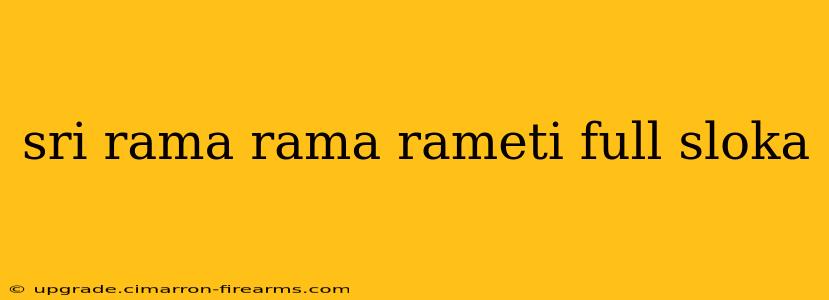The phrase "Sri Rama Rama Rameti" is not a complete sloka (verse) in itself, but rather the beginning of a popular mantra dedicated to Lord Rama, a central deity in Hinduism. This short, yet powerful, invocation is part of a longer hymn, often found within various scriptures and devotional texts. Let's explore the full sloka, its meaning, and its significance in Hindu spirituality.
Understanding the Complete Sloka
While variations exist, a common version of the complete sloka incorporating "Sri Rama Rama Rameti" is as follows (note that transliteration from Sanskrit can vary slightly):
श्रीराम राम रामेति रमे रामे मनोरमे। सहस्रनाम तत्तुल्यं रामनाम वरानने।।
Śrī Rāma Rāma Rāmeti Rame Rāme Manorama | Sahasranāma Tattulyaṃ Rāma Nāma Varānane ||
Translation:
"Sri Rama, Rama, Rama, thus meditating on the delightful Rama, The name of Rama is equivalent to the Sahasranama (thousand names), O beautiful faced one."
Decoding the Meaning
This sloka beautifully encapsulates the power and potency of chanting the name of Lord Rama. Let's break down the individual components:
-
श्रीराम (Śrī Rāma): "Sri" denotes auspiciousness and divinity, while "Rama" is the name of the Lord. The repetition emphasizes the devotion and reverence.
-
रामेति (Rāmeti): This indicates the continuous chanting or repetition of the name.
-
रमे (Rame): Means "to delight in" or "to be pleased with." It emphasizes the joy and devotion experienced during the chanting.
-
रामे मनोरमे (Rāme Manorama): "Manorama" translates to "delightful" or "beautiful," further amplifying the attractiveness and grace of Lord Rama.
-
सहस्रनाम तत्तुल्यं (Sahasranāma Tattulyaṃ): This crucial part highlights the significance of chanting Rama's name. "Sahasranama" refers to the thousand names of a deity, often found in hymns. This line states that simply chanting "Rama" is equivalent in spiritual merit to reciting the entire Sahasranama.
-
रामनाम वरानने (Rāma Nāma Varānane): "Varānane" means "O beautiful faced one," an address to Lord Rama. This adds a personal and devotional touch.
The Spiritual Significance
The sloka underscores the profound spiritual benefit derived from the constant remembrance and chanting of Lord Rama's name. It suggests that even a simple, repetitive mantra can lead to profound spiritual growth and purification, mirroring the power of bhakti yoga (devotional yoga).
The equivalence to the Sahasranama signifies that the essence of the thousand names—all the attributes and qualities of Lord Rama—is encapsulated within the single name itself. This simplifies the path to spiritual attainment for devotees. The repetition is not merely rote; it's a meditation, a constant connection with the divine.
The mantra is often used for:
- Stress reduction: The rhythmic repetition can calm the mind.
- Spiritual growth: It fosters devotion and strengthens one's connection to the divine.
- Inner peace: It helps cultivate tranquility and a sense of well-being.
Conclusion
The seemingly simple "Sri Rama Rama Rameti" is far more than just a phrase; it is a gateway to a deeper understanding of devotion and the power of chanting the divine name. The full sloka reveals the profound spiritual significance embedded within this beautiful mantra, offering a path to inner peace and spiritual growth for those who chant it with devotion and sincerity. Its repetitive nature makes it accessible to all, irrespective of spiritual experience.

